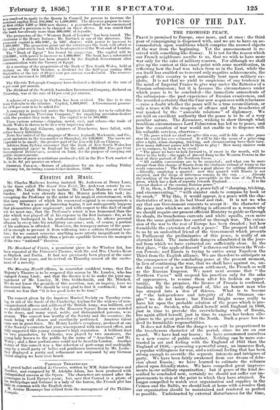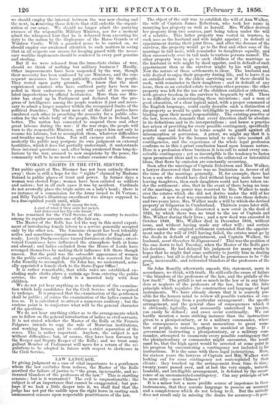TOPICS OF THE DAY.
THE PROMISED PEACE.
PEACE is promised to Europe, once more, and at once : the third year of campaigning is dispensed with, and we are to have an ac- commodation upon conditions which comprise the avowed objects of the war from the beginning. Yet the announcement is re- ceived with something like dismay. It is not for the reason which our French neighbours ascribe to us, that we wish to have more war only for the sake of military renown. For although we shall give up the contest at this exact point with some mortification' in reflecting how the lead was taken from us in the East, while the
sea itself has enabled us to record only negative achievements, the
people of this country is not naturally: bent upon military ex- ploits. It is not that we yield to suspicions of any tendency in the mind of Imperial France to give way under the flatteries of a Russian submission ; but it is because the circumstances under which peace is to be concluded—the immediate antecedents of the submission—the past experience of Russian evasiveness and the recorded certainty that the Czar now acquiesces with reluctance —raise a doubt whether the peace will be a true reconciliation, or only a truce with the weapons of offence and the treacheries of war masked by the "amicable relations" of diplomacy. We are told on excellent authority that the peace is to be of a very peculiar nature. The Examiner wishing to show through what troublous circumstances Lord Palmerston has led us to peace, and how the cessation of war would not enable us to dispense with his valuable services, observes- " The peace which we shall see after this war, will be like no other piece - that the workl has ever witnessed. It will be like the scene of a prize-ring after a fight, when sharping, tricking, and circumventing have their tuna. How many different games will be there to play ! How many sinister ends yet to compass, by hook or by crook !
"The peace we have to look forward to, if sweet in the mouth, will be bitter in the belly—the apple of discord flung to the Western Powers in the heat of their pursuit of the Northern Cacus "All sudden conversions are to be suspected ; and what can be more
abrupt than this change of Russia from the obstinate retinal of terms to the ready concession ? The French have a good phrase for settling differences —literally, emptying a quarrel : now this quarrel with Russia is not
emptied, and the dregs of bitterness remain in the cup Already the working of the Russian game is perceptible in the tone of the French press, which has a dash of asperity towards England It is the forecast shadow of the coming Russian peace."
It is, then, a Russian peace, a peace full of " sharping, tricking, and circumventing," "with sinister ends to compass by hook or by crook." 'Why this, it would appear, is a peace with the cha- racteristics of war, in its bad blood and risk. It is not we who say that our Government consents to accept it : the character of the peace into which we are drifting is advanced as a reason why we should require our present efficient Ministry to guide us through its 'shoals, its treacherous currents and white spells, even more than the same guidance has carried us through war. The eaten,- ' sion of the war to the rest of Europe has been dreaded ; but how . formidable the extension of such a peace The prospect held out to us by an undoubted friend of the Government which presents to Parliament the preliminaries of this peace, is really of an alarmist kind. The immediate dangers adumbrated in the jour- nal from which we have extracted are sufficiently clear. In the first place, "the apple of discord" is thrown out between the West- ern Powers; and Russia is trying to entice away Napoleon the Third from the English alliance. We are therefore to anticipate as the consequence of the concluding peace at the present moment, in lieu of continuing the war, that we shall have against us, un- der the cover of a new European settlement, the French as well as the Russian Emperor. We must next assume that " the Northern Cacus" will suspend his practices only for the sake of appearances, to resume them after his fashion on oppor- tunity. By the premises the licence of Prussia is confirmed. Sardinia will be easily. disposed of, like an honest man who has strayed into a den of thieves. What is to become of "the independence and integrity of the Ottoman em- pire" we do not know ; but Friend Bright seems really to have hit upon the probable solution of the peace which is pro- mised to us. Sweden, who allied herself with England in 1808, just in time to provoke the overwhelming wrath of Russia, has again allied herself, just in time to expose her broken alle- giance to the great protector of the North. Such a peace has in- deed its formidable responsibilities.
It does not follow that the danger to us will be proportioned to the treacherous character of the period, since we are on our guard. We have had our lesson ; we have accustomed ourselves to a new course of public conduct. Nothing can be more con- trasted in net and feeling with the England of 1851 than the England of 1856,—possessing a powerful army, an immense fleet, a popular willingness for war, and a national feeling that has been strong enough to override the separate interests and intrigues of
party. We have been fairly awakenedfrom our dream of delu- sion about Russia ; we have learned to estimate the reliance
placed upon friendly states. We have compelled great improve- ments in our military organization ; but if peace of the kind de- scribed be concluded now, certainly we should not suffer our im- provements to stop at the point to which they have attained. No longer compelled to watch over organization and supplies in the Crimea and the Baltic, we should look at home with a resolve that our organization should be maintained and rendered as perfect as possible. Undistraeted by external disturbances for the time, we should employ the interval between the war now closing and the next, in removing those defects that still enfeeble the organi- zation of oar army. We should no longer admit the parrying excuses of the responsible Military Minister, nor for a moment admit the whispered hint that he is debarred from executing his duty to the nation by the displeasure of the Horse Guards or of Windsor Castle. With a guarded peace to be carried on, we should employ our awakened attention to such matters in seeing that in all respects our means for keeping guard with the neces- sary warlike implements should be rendered in every part genuine and sterling.
But if we were released from the immediate claims of war, should we think of nothing but military business ? Hardly. Other improvements have been suspended by the war, though their necessity has been confessed by our Ministers, and the con- sequent measures have been patientlE awaited by the people. They rested upon party grounds. We know that the most experienced senators who have outlived party have been im- peded in their endeavours to purge our code of its accumu- lated imperfections by official hesitancies. More than one Min- ister has stood up in Parliament and declared that the pro- gress of intelligence among the people renders it just and neces- sary to admit a larger number within the recognized limits of the pohtical franchise. The head men of all the chief parties have emulated each other in preaching the necessity for a public edu- cation for the whole body of the people, like that in Ireland, but better. The nation has consented to suspend these and other great labours during the war : if the war stops, the people will turn to the responsible Minister, and will expect him not only to resume his labours, but to accomplish them, whatever difficulties and troubles may beset him. Nor will excuses avail. However modestly the public may postpone its own judgment on external hostilities, which it does but partially understand, it understands those internal questions ; and after being awakened from long de- lusions by the war, aroused to new suspicions by the peace, the community will be in no mood to endure evasions or shams.











































 Previous page
Previous page